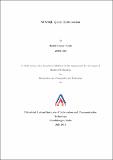Please use this identifier to cite or link to this item:
http://drsr.daiict.ac.in//handle/123456789/317| Title: | SPARQL query optimization |
| Authors: | Chaudhary, Sanjay Singh, Rohit Kumar |
| Keywords: | Database management Semantic Web Ontology Semantic Analytics Information storage and retrieval systems Programming languages Semantics Computer systems Optimisation RDF Query Processing Spatia Query Processing Temporal Query Processing SPARQL |
| Issue Date: | 2011 |
| Publisher: | Dhirubhai Ambani Institute of Information and Communication Technology |
| Citation: | Singh, Rohit Kumar (2011). SPARQL query optimization. Dhirubhai Ambani Institute of Information and Communication Technology, ix, 64 p. (Acc.No: T00280) |
| Abstract: | Query Optimization is the process of selecting the most efficient query evaluation plan among the many strategies possible for processing a given query, especially if the query is complex. The users are not expected to write their queries in such a way so that they can be processed efficiently; rather it is expected from system to construct a query evaluation plan that minimizes the cost of query evaluation. In any query optimization, the goal is to find the execution plan which is expected to return the result set without actually executing the query or subparts with optimal cost. Query engines for ontological data mostly execute user queries without considering any optimization. Especially for large ontologies,optimization techniques are required to ensure that query results are delivered within reasonable time. SPARQL can be used to express queries across diverse data sources, whether the data is stored natively as RDF or viewed as RDF via middleware. So, Query optimization may speed up SPARQL query answering by knowledge intensive reformulation. In our research work, we have proposed learning approach to solve this problem. In our approach, the learning is triggered by user queries. Then the system uses an inductive learning algorithm to generate semantic rules. This inductive learning algorithm can automatically select useful join paths and properties to construct rules from a ontology with many concepts. The learned semantic rules are effective for optimization of SPARQL query because they match query patterns and reflect data regularities. |
| URI: | http://drsr.daiict.ac.in/handle/123456789/317 |
| Appears in Collections: | M Tech Dissertations |
Files in This Item:
| File | Description | Size | Format | |
|---|---|---|---|---|
| 200811033.pdf Restricted Access | 2.71 MB | Adobe PDF |  View/Open Request a copy |
Items in DSpace are protected by copyright, with all rights reserved, unless otherwise indicated.
